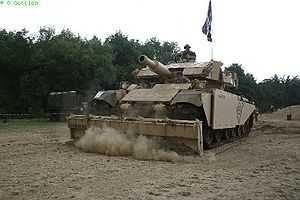Operation Motorman
| Operation Motorman | |
|---|---|
| Part of The Troubles and Operation Banner | |
| Location | |
| Planned by | Major-General Robert Ford |
| Objective | Retake republican-controlled areas |
| Date | 04:00, 31 July 1972 (+01:00) |
| Executed by |
|
| Outcome | Operation succeeds |
| Casualties |
|
Operation Motorman was a large operation carried out by the British Army in Northern Ireland during the Troubles. The operation took place in the early hours of 31 July 1972 with the aim of retaking the "no-go areas" (areas controlled by Irish republican paramilitaries) that had been established in Belfast, Derry and other large towns.
Background
The Northern Ireland riots of August 1969 marked the beginning of the conflict known as "The Troubles". As a result of the riots, Northern Ireland's two main cities—Belfast and Derry—had become more segregated than before. Many neighbourhoods became either purely Irish nationalist and republican or purely unionist and loyalist. In some places, residents and paramilitaries built barricades to seal-off and protect their neighbourhoods from incursions by "the other side", by the security forces, or both. These became known as "no-go areas".
By the end of 1971, 29 barricades were in place to block access to what was known as Free Derry; 16 of them impassable even to the British Army's one-ton armoured vehicles.[1] Many of the nationalist/republican "no-go areas" were controlled by one of the two factions of the Irish Republican Army—the Provisional IRA and Official IRA. On 29 May 1972, the Official IRA called a ceasefire[2] and vowed that it would only launch attacks in self-defence.
On 21 July 1972, in the space of 75 minutes, the Provisional IRA detonated 22 bombs in Belfast. Eleven people (including two soldiers and a loyalist volunteer) were killed and 130 were injured. This attack prompted the British Government to implement Operation Motorman, just ten days later.[2]
Preparations
Operation Motorman would be the biggest British military operation since the Suez Crisis of 1956, and the biggest in Ireland since the Irish War of Independence.[2] In the days before 31 July, about 4,000 extra troops were brought into Northern Ireland.[2] Involved were almost 22,000 soldiers[2]—including 27 infantry and two armoured battalions—aided by 5,300 soldiers from the local Ulster Defence Regiment (UDR).[3] Several Centurion AVRE demolition vehicles, derived from the Centurion tank, were used. These were the only heavy armoured vehicles to be deployed operationally by the British Army in Northern Ireland during the Troubles. The tanks had been transported to Northern Ireland on board the amphibious landing ship HMS Fearless, and were operated with their turrets traversed to the rear and main guns covered by tarpaulins.[4]
This quick military build-up alerted the Provisional IRA and Official IRA that a major operation was being planned.[5] According to local MP Ivan Cooper and others, the IRA left Derry's no-go areas the day before the operation.[6]
The operation


Casualties
During the operation, the British Army shot four people in Derry, killing a civilian and an unarmed IRA member.
- Daniel Hegarty, a 15-year-old Catholic civilian,[10] was shot along with his two cousins as they walked along Creggan Heights in Derry.[11] The boys had gone out to see the tanks and watch the operation unfold.[11] The shots were fired from close range by soldiers who had hidden themselves behind a garden fence.[11] Daniel was shot twice in the head and was killed outright. One of his cousins, Christopher Hegarty, survived being struck in the head by a bullet.[12]
- Seamus Bradley, a 19-year-old Provisional IRA member,[10] was shot as he climbed a tree in Bishop's Field, Derry. Seamus was then taken away in a Saracen APC but bled to death before he could be treated.[5]
In Belfast some arrests were made but no armed resistance was met.
Aftermath
A few hours after the conclusion of Operation Motorman, the Claudy bombing occurred. Nine civilians were killed when three car bombs exploded on the Main Street of Claudy village, County Londonderry. Five of the victims were Catholic and four were Protestant.[13]
See also
References
- ↑ Taylor, Peter (2001). Brits: The War Against the IRA. Bloomsbury Publishing. p. 83. ISBN 0-7475-5806-X.
- ↑ 2.0 2.1 2.2 2.3 2.4 2.5 CAIN: Chronology of the Conflict – 1972
- ↑ An Analysis of Military Operations in Northern Ireland, prepared under the direction of the Chief of the General Staff. Retrieved 2 September 2007.
- ↑ Osprey Publishing: Centurion Universal Tank 1943–2003 ISBN 1-84176-387-X
- ↑ 5.0 5.1 5.2 Museum of Free Derry: Operation Motorman
- ↑ "IRA left Derry 'before Operation Motorman'". BBC News, 6 December 2011. Retrieved 8 December 2011.
- ↑ The Pat Finucane Centre: Operation Motorman
- ↑ History – Operation Motorman, Museum of Free Derry. Retrieved 2 September 2007.
- ↑ Operation Motorman from Britain small wars
- ↑ 10.0 10.1 CAIN – Sutton Index of Deaths – 31 July 1972
- ↑ 11.0 11.1 11.2 The Pat Finucane Centre: Daniel Hegarty
- ↑ "'No reason' for soldier shooting Daniel Hegarty". BBC News, 7 December 2011. Retrieved 8 December 2011.
- ↑ Cowan, Rosie (21 September 2002). "Does this letter prove a priest was behind IRA bombing?". The Guardian (London). Retrieved 20 May 2010.
External links
- The Pat Finucane center
- Operation Motorman from Britain small wars
- CAIN project
| ||||||||||||||||||||||||||||||||||||||||||||||||||